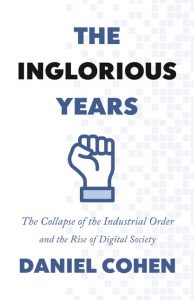In an interview about his new book, The Inglorious Years, economist Daniel Cohen explores the emergence of the digital society and its never-ending pursuit for growth.
Every morning, millions of people wake up, power on their computers, and begin their day. Teachers teach classes, doctors see patients, and students take classes—all online. With no commutes and without the distractions of the office, workers are expected to be productive and maximize every minute of their workday. Although Covid-19 might have sped up the shift to remote work and virtual meetings, that is the path the digital society was already on anyway. But how did we get here?
That’s what economist Daniel Cohen sets out to find out in his new book The Inglorious Years: The Collapse of the Industrial Order and the Rise of Digital Society, which weaves through the historical narrative of the past 50 years in the US and France. According to him, we have come a full circle: from the youth of the 1960s wanting to break free from the industrial society of the time to today’s youth wanting to break free from a “new, equally demanding world.” The industrial order might be long gone, but the digital one is not much better: “The digital world ‘industrializes’ the service economy, creating a hybrid being of flesh and algorithms,” writes Cohen.
“The digital revolution is about industrializing the service economy. It is about industrializing the post-industrial world.”
Digital technology did not just invade and transform our work lives. It’s also permeated into our personal lives. As companies like Google, Amazon, Facebook, and Apple (GAFA) grew, so did their influence over our lives. As Cohen puts it: “In the algorithmic life proposed by GAFA, the ‘private self’ is lost and the privacy of the home shattered.”
So, how did we get here? And what awaits us in the next fifty years?
The Demise of the Industrial Order
To economists, the 1960s were “the best of all times,” according to Cohen, who is the director of the Economics Department at the École Normale Supérieure and a founding member of the Paris School of Economics. Growth was rapid, there was little inequality—and yet, the young people were dissatisfied.

“What was not working in the 60s, from a cultural point of view, was that the growth was very good, it was very inclusive, with very little inequality, but it was a very vertical society, a very obedient society,” Cohen explains in an interview with ProMarket. “That is, you had to take your orders from someone who took their order from someone else, and so on. It was really a very strict command-and-control kind of economy. And sociologically speaking, everybody would watch the same TV show and so on. So, it was a very uniform assembly line kind of society. And this is what the youth everywhere in the world refused.”
As the world shifted away from the industrial order, Reaganomics took its place. Companies sought to cut costs, and increase productivity in pursuit of growth.
“The demise of the industrial order has led to an economy that was much more competitive than the one that was there before, because a control-and-command economy was very vertical,” says Cohen. “Everybody was tied to the same order. The janitor would be paid in a way that was indexed [by] how much a CEO was making. If the CEO was augmenting his or her own salary by 10 percent, the janitor in that same factory down at the end would get a pay increase of exactly the same number. And it was impossible to think differently at the time. So the dismantling of that was brought by the Reagan revolution, as much as for the fact that industry has reached its limits, and it led to a world where everything became much more competitive.”
Jobs like janitors, security, and others were outsourced to outside companies. Now, those companies would compete among themselves for contracts and the janitors were no longer part of the firm that they spent their days cleaning.
“That led to an inegalitarian society with much more competitive pressure which, in the case of the US, led to an explosion in inequality, because from that moment on, when the CEO would get a pay increase of 100 percent it did not translate at all into an increase of a 100 percent for the janitor,” says Cohen. “In fact, most of the time, that would be correlated to a decrease in the wage of the janitor, because the reason why that CEO could get an increase was because he was managing to reduce costs and reduced the cost paid to the janitor.”
The one question that even Cohen seems to still be grappling with is whether the trade-offs between the old industrial order and the new post-industrial society were worth it. The new post-industrial order—a digital economy that would deliver technological liberation and prosperity—did not materialize. Instead, people found themselves tied to screens, chasing efficiency, trying to maximize every second of their workday.
The Digital Society and the Never-Ending Pursuit of Growth
As the industrial order was coming to an end, the future that many then imagined was more human-oriented. As Cohen writes in the prologue to The Inglorious Years:
“To understand the nature of the disillusionment that the end of the industrial world has brought about, we must reread Jean Fourastié’s Great Hope of the Twentieth Century, a fundamental work published in 1948. The hope of the new era, according to that major economist, was that human beings, having worked the soil in agrarian societies, then materials in industrial society, would now concern themselves with other human beings, in a society where work time would be dedicated to people rather than objects, in the fields of health, education, or leisure activities. It is that hope for a more human economy that has been betrayed. Fourastié underestimated the importance of one essential point: the irresistible need for growth in modern societies.”
Currently, the service industry is booming. In 2018, the professional service industry in the US generated $2 trillion in revenues. The problem with professional industry, says Cohen, is that there are still just 24 hours in the day. If the good you produce is the time that you grant your client, there is no growth besides what you can do within the eight-hour workday.
As Cohen explains later on in his book:
“For Fourastié himself, there was no doubt that the service society, no longer being subject to the invasion of machines, would make economic growth disappear. Without new technologies, wage stagnation became inevitable. All those jobs in the service industry—the doctor who cares for a patient, the teacher in charge of a class, the actor who fill a theater—must deal with the absence of ‘economies of scale’ that would allow a single service provider to reach an ever great number of clients.”
What Fourastié envisioned was a “humanized society,” a world with no growth.
“No growth, but I’ll take care of you, you take care of my mother, and my mother would take care of your own sister, who will take care of myself,” explains Cohen. “That’s a new world, where time spent with others will be the true unit. Now, I think this is a wonderful premise, something of the kind the boomers of the 60s had in mind. We live in a world where you usually criticize the Boomers now, but this is a world that they had in mind. This is the economic model that they had in mind: Let’s stay together. Let’s take care of each other. We don’t need this assembly line.”
“If you don’t deliver growth, people are unhappy. If you don’t deliver growth, capitalism does not deliver profit.”
That post-growth world never had a chance, mainly because new digital technologies did invade our lives. And so, Cohen says, we continue live in the world obsessed with growth.
“The problem is that we live in an economic system, and also in a political system, where you need growth. If you don’t deliver growth, people are unhappy. If you don’t deliver growth, capitalism does not deliver profit. So, you need daily growth in a service economy where there’s no growth possible. And this has been the question for 50 years, since the beginning of this book in May 1968: How do we deliver growth in the service economy? And the answer we now know is the digital economy. That’s what all this is about. We can speak at a distance, we don’t have to travel. We don’t have to be face to face. So the digital revolution is about industrializing the service economy. It is about industrializing the post-industrial world.”
Cohen wrote The Inglorious Years before the Covid-19 pandemic began, but the way work and life shifted during the pandemic really drives home the point that he wanted to make all along. If we no longer have to meet face to face, whether at work or school, we gain more time. We can have more clients. Even doctors can virtually “see” more patients now. Cohen predicts that artificial intelligence will “end a big chunk of what the doctor used to do.” The reason the Zooms and Netflixes of the world were so successful during the pandemic is because “they were designed for that,” says Cohen. “They were designed to avoid meeting face to face.”

In his interview with ProMarket, Cohen explored the tradeoffs societies made, our relationships with technology, and potential solutions like breaking-up Big Tech and universal basic income.
[The following conversation has been edited and condensed for clarity and length.]
Q: Earlier, you were talking about splitting out the janitors from the company. The way you described it in the book is that you don’t have inequality within the company, you have inequality between companies. By splintering out different groups of people, companies get rid of the solidarity among the workers.
Exactly. It’s a community. There’s been really two phases in the dismantling of the old industrial order. The first phase was really the Reagan moment in which we had the financial revolution. What happened was really splitting out the janitors, putting the janitors out of the factory, because there was no reason why their wages would be indexed along with the CEO’s, and that is really what created, in the case of the US very specifically, this explosion of inequality. There is a paper, which I think I quote in the book that shows that 85 percent of the inequalities came not from within firms, but across firms. Within firms inequality somehow has rather decreased, because people are more alike. This is your first building block of the new industrial order, there is your industry without the glue that puts together the different classes of society.
Q: One of the examples you used in your book was the movie Her (2013), where it’s the artificial intelligence having relationships with thousands of people at the same time. That’s what we’re kind of getting to now, as you mentioned, even with going to the doctor. If our data is so easily available, it reduces the amount of time we have to spend with other people.
Exactly. I think this movie for me was really a defining moment of my own understanding of what I was trying to write. The way I would want to write this book was really very much influenced by this movie, because it was a really a perfect illustration of what we are talking about. There are two stages really in this movie. First, it is to demonstrate that the human can fall in love with a computer. The movie shows, with the voice of Scarlett Johansson, that this is possible. And I add some pieces in the book about psychoanalysis, explaining, for instance, why in the army you will see soldiers willing to die sometimes to save the robots. The artificial intelligence knows so much about you, more than anyone else could ever know. There is an advantage to the computer. This Scarlett Johansson can get a million other people attracted to her. That’s the point. The robots can be as clever with as many people as they want. That’s cost cutting.
If it was one robot per person, great, but then [you can] get a human that’s the same price. No, it’s one robot for a 1,000 people. The thing that endures the development of the service economy is—when the economy is growing—returns to scale. That is, you want one guy to be able to have a 1,000 clients. You want one doctor to be able to take care of not just one or two or five or 10 clients, you want to put a zero to that. That’s what the digital economy is doing.
Q: At the end of your book, you discussed some of the proposals to rein in the power of Big Tech. You talk about possibly limiting the monopoly power or taking it away from large companies like Facebook. Do you have a preferred way for doing that, like breaking them up?
Although I’m an economist, I think it’s less an economic problem than a cultural problem, really. But as an economist, yes, I would have prevented Facebook from buying Instagram. I would impose on Microsoft the splitting of the software and the hardware.
So, more of these things, certainly, to make sure that you don’t put in few companies all the power that there is. But beyond that, what scares me is the new mentality that is arising in this new digital order: the fake news, social networks, in which people really act like sects. There is a huge change of mentality, which is brought on by this digital society, which I think we cannot be happy with. And again, it’s because if you want growth, you have to give up on some of your humanistic hope, expectation. I think there is underlying all this a tradeoff that societies sometimes unconsciously consent to and sometimes are obliged to accept between more growth, which means cost cutting, which means giving up on humanistic values.
Q: One of the things Covid has changed in the US is that it brought the conversation about universal basic income more into the mainstream, just by the nature of the stimulus payments that people have been receiving. In your book, you write that we should be thinking seriously about universal basic income and take it even further.
I am in favor of it, definitely. But I don’t want to let people think that this really is a solution to the problem. Yes, it is part of better social security contract. People can be taken care of. We see that there is more competitive pressure. So, if people are just ejected out of the labor market, I don’t want them to fall in the hole of nothing. I want them to take the time to ponder on whether they should accept this new job or take more time to find another one. There’s more uncertainty at the individual level. Again, the growth is less inclusive than it was in the 50s and 60s, so you need to grant more protection to the individuals.






